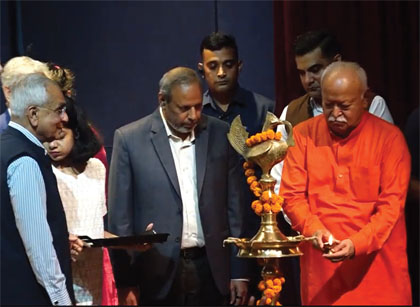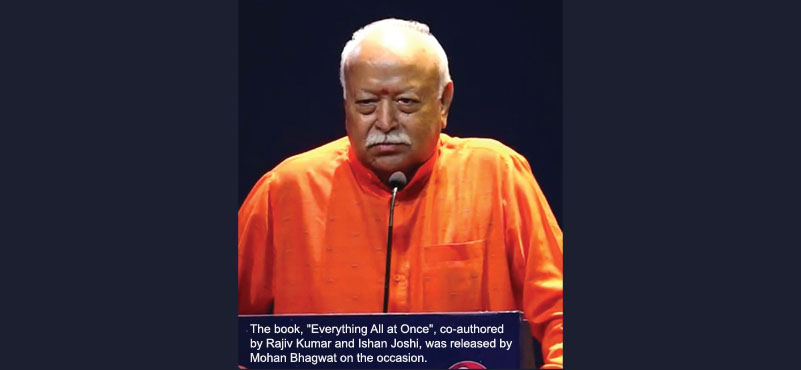Mohan Bhagwat in conversation, on the occasion of the book launch. Rooted in the soil of India, the RSS supremo is confident that we will have to mix modern day narratives with our own deep driven solutions over time. Blending the two, the materialistic with the spiritual, keeping body and mind and soul together, we will show the way to the world. This conversation, delivered in chaste Hindi, has been translated in house. Discrepancies, if any, are regretted and incidental, as the message is here for us to imbibe.
As the book describes, six major changes have come about abruptly. How do we address them? The fundamentals of the way we were going forward have been shaken — not just ours, but those of the world as well. So, everyone is in a rush to readjust. We too will have to. Everyone understands this. Another thought that comes to mind when we contemplate the issue is about circumstances. Circumstances keep changing. This is not the first time that such changes have occurred. They have occurred in the past and will also happen in the future.
 So, we have to move ahead continually, changing ourselves according to the times we live in. It is important that we do so if we wish to sustain ourselves in an ever-changing world. But in that, too, I think we must consider one thing: Is it mandatory that it must happen this way? These changes also offer some hints or clues, which are mentioned in the book. And we all know that. Just now, Munjal Sahab spoke of the “gap” – that the gap between wealth and poverty has widened.
So, we have to move ahead continually, changing ourselves according to the times we live in. It is important that we do so if we wish to sustain ourselves in an ever-changing world. But in that, too, I think we must consider one thing: Is it mandatory that it must happen this way? These changes also offer some hints or clues, which are mentioned in the book. And we all know that. Just now, Munjal Sahab spoke of the “gap” – that the gap between wealth and poverty has widened.
That has not happened on its own. It is our doing. The system or methodology we adopted led to it. So, we should assess whether it is our mistake or the methodology’s. If we see the history of the prevailing methodology, since it started, which has a 250–300-year history, then we recollect that the gap will only widen. The methodology is such. Survival of the fittest is its foundational tenet.
This means the destruction of the unfit is taken for granted. The world has all types of people, from the most able to the disabled. But if your fundamental perspective is that nature’s law is such that the weak will die, then it means that at some point in time, you will let the weak die. It is fine as long as you have kindness. But how long does such kindness exist?
We are undertaking growth and development. But what are they in reality? What all does your imagination encompass when you think about growth and development?
Someone mentioned “some of the softer aspects.” What are those, and how essential are they? How essential do you think they are? The perspective behind the prevalent theory or methodology assumes economics to be everything. That is at the center. Everything else is there… they won’t deny that. But why? For this — economics. Salvation has to be attained. Why? Because the pleasure of heaven has to be attained. And the imagination of the pleasure of heaven is the same: the pleasures of body, mind, and wisdom.
The imagination of salvation from the duality of pleasure and pain is not there. So, there are some shortcomings in the core philosophy because of which… I had talked about the seven sins as mentioned by Gandhi Ji in a Vyakhyan Mala the day before yesterday. Those sins invariably creep in. If we have to manage them, we must think from our own perspective.
Fortunately, our country’s perspective — if I say the traditional perspective, people will call me a revivalist and traditionalist. But life’s perspective is not new or old. It is eternal. It is based on the experiences of our ancestors across thousands of years, and we keep refining it.
They (Westerners), too, have a perspective, and their ideals (such as the survival of the fittest) are based on it. wThey may be incomplete, but they have given something to it. They are moving ahead with that. We have our own perspective, and we have been living with it. The world is talking about some things; globally, they are talking about the environment. The world is talking about sustainable development.
We have already done it based on our perspective. Our agriculture dates back 10,000 to 12,000 years. The land should have been so infertile! Had we used methods to increase soil fertility over such a long time, our land would have been completely unsuitable for farming. I say this authoritatively as I am associated with that stream of science. But that is not the case.
The virgin lands of Africa were used for farming from that perspective. In 400 years, there was a need to bring in more regulations, such as keeping the land vacant for five years and not adding chemicals to it. We didn’t do that for thousands of years. For us, it happened much later, only when we denounced our methodologies and embraced a foreign methodology. Why did we do that? We needed more! Why did we need more? We needed money. That has its importance.
In our perspective, the act of earning wealth has not been canceled. On the contrary, it is compulsory. The four objectives of human life that must be achieved also include economic prosperity (Arth) and psychological values (Kaam).
That has been tied to the bond of dharma. Dharma (here) does not mean the method of worship. The rules overseeing all this, ensuring that no one is left behind and that no aspect of pleasure (sukh) is left untouched, is called dharma, which is also a natural law. One has to move ahead with discipline. That discipline is not present in this (foreign/western) perspective. Just look at the world’s history in the past 2,000 years; many experiments were undertaken to make the world a happier place, but all of them failed.
They did not attain their proclaimed objectives entirely. And they created more problems while achieving some semblance of success. These problems have become monstrous and are scaring humanity. I am not painting a black picture. That is also an aspect. Another aspect is that science and technology have grown. Life has become more comfortable compared to the past.
We have vehicles now. Previously, we would walk or cycle. We save a lot of time and effort. Our knowledge about material things has increased tremendously. The science of physics now even proclaims that it can read the mind of God. New technologies have come about. This is great, but, along with it, it depends on the one using these technologies. New things will come. Humans are thinking beings. As thinking beings, humans will continue to contemplate new things and unearth new information.
But how to use and implement these new technologies and information will depend on the user’s (human’s) tendency — why, in development, the joy of body, mind, and soul must be accessible to all. At the same time, there must also be concern about how to continuously make the tendencies and nature of the users more welfare-oriented. Many things must be contemplated to do so.
We have to come out of the existing situation. We can’t walk with our eyes shut or turn our backs on the circumstances. It is here. So be it. Whatever needs to be done to ensure we manage to move ahead from here must be done. But while doing so, is it our compulsion that we must continue to move ahead in the same circumstances?
Change has not dawned like that! It has come about due to ‘out-of-the-box’ thinking. While people had to navigate the existing circumstances, they wondered if that was the way ahead and whether there was another path. We will have to think. The world has tried out two types of paths: believers in God and non-believers; one giving primacy to the individual and one keeping the group at the forefront; those concerned about development and those concerned about the environment. There are two paths everywhere, and people have tread both, but they did not get the results.
Instead of quarrelling over the primacy of trade, commerce, or agriculture, all three can be managed together. People can continue on the path of development, and the environment can also remain well; this is possible. We have done this, and this is not an adage. We have given the world. Books are being released on this subject. India has influenced the world.
It is important that we forge our own path because if we go through these circumstances, using this methodology, then we will find ways to protect ourselves. We may save ourselves. But we will have to face these things inevitably. We can only postpone them because the fragmented way of looking at things creates two classes: I and the rest, or we and them. Us and them.
Everyone has their interests, and they are divergent. So, there will be a conflict of interest. There are not just national interests. There are personal interests too. I would want to control everything wherever I am because it is about the survival of the fittest. So, the one at the top of the food chain will devour everyone. It is a crime to be at the lower end of the food chain because you will die sooner or later. How will we go about it if that is our instinct? That is why there is no credibility. Nations have determined sustainable goals. Who has attained them? Only India. No one else, because where is the credibility?
If we had to fight in every confrontation, then we would have been constantly fighting since 1947. But we tolerated and did not let wars happen. In our policy, we have even helped those who are opposed to us in their difficult times. I must live whether or not the world survives — there will be dishonesty in this perspective, and hypocrisy will increase. Is it compulsory to take this path? Can there be no other way?
If we wish to become Vishwaguru and Vishamitra, then we must start thinking along these lines. Otherwise, we will remain a country that aligns with the big nations, simply because we cannot be ignored, because we aren’t that small. So, while we must continue to do what is needed in the now, we must equally think about how to restore the course of the Ganges that has begun to flow backward. While the first matter is urgent, the latter (changing the course of the prevalent methodology) will take time. But it has to be done surely, else books like these will need to be written repeatedly.
One thing to consider is that we, along with the world, have traversed in the opposite direction so far that if we change course abruptly, the vehicle will topple (the sudden change will lead to chaos). It simply cannot happen abruptly. We have to undertake a directional change, but this does not mean that we have to hark back to the days of the bullock cart. However, we will have to create a standard or model that is relevant to our times and based on our eternal perspective and vision.
Our country will have to become a model based on this, where there is a pinnacle of material growth created by modern knowledge, and we have also solved the problems created as a result of that growth. We will have to create such a nation; for it to happen, we will have to turn slowly. In the present circumstances, while doing what is needed now, we have to take a long arc to change our course slowly. This requires a lot of brainstorming, and this must be contemplated by our thinkers.
What is happening outside (globally) and how we can internalize the good experiments into our fold must equally be contemplated. Based on our perspective, we can tell how to face the questions confronting the world today.
Our country’s example will be the best guide because we have diversity. The world could not manage diversity. We have environmental challenges and solutions. There are many such things. India is a mini world, and we have received it as part of our heritage. We have not made it that way, but it is how it is. Maybe our ancestors created it. But there is a world in India, and it can show the way; the world too shall follow. This book has commenced the brainstorming needed to do so.
There are many groups in India that think about development with an open perspective and mind. They are not regimented. There was mention of the system. Our country will have to make its own system. The system was created by the British to rule, not to nurture the people. They had to collect revenue and maintain law and order.
After independence, as a democracy that imbibes the principles of ‘we the people,’ it needs to create a system that is answerable to the people and not the rulers. Such will be its instincts and training. There is much to do. Some of it has started. It is not that these ideas occurred to me suddenly. We have brainstormed on it for some time. The implementation, even though late, has begun, but we will have to think about all these things.
The nation has its thought, mind, and body (its citizens). Chanakya propounded the definition of a nation. He said that the crux of a nation is not just power, but water, jungles, land, and animals. Ecology, biodiversity, everything. That is the fundamental.
You need everything else to keep these right! You need a state and a strong ruler. Fort, treasury, ministers, and friends (internationally) keep changing. How do we manage these aspects from our perspective, as we will have to create a decentralized structure for everything we do if we take everyone’s opinion in a large country like ours?
For instance, I say this often: there should be production, but it should be production by the masses instead of mass production. It will take a long time to achieve this as the times are of mass production. And we have to compete with them. So, can we compete with production by the masses? Not today, but maybe tomorrow! We will change course steadily and slowly.
We have to think about the direction of many such things while aligning to the time we live in to ensure “Sarve vai sukhinah santu” (may all be happy) and not the maximum good of the maximum people. That Sukh (joy/happiness) should be all-encompassing. As said here: everything, everywhere, all at once. It should also include: everything — body, mind, intellect, and soul. Economic activity must be tied to dharma and aligned to the ideals of moksha. That too should happen. All of us should witness the oneness of the world. There should be an environment of Vasudhaiva Kutumbhakam. This is not a theory. We have accomplished it and demonstrated it for 3,000 years.








